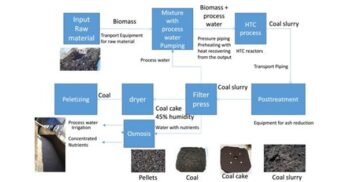New publication: HTC for Valorisation of Organic Waste and Sewage Sludges
Hydrothermal Carbonization (HTC) for Valorisation of Organic Waste and Sewage Sludges for Hydrochar Production and Biofertilizers
This is the second of a case study compilation to explore lessons on material and energy valorisation of waste within the framework of IEA Bioenergy Task 36. The central technology in this case study is Hydrothermal Carbonization (HTC), an innovative process that can process a diverse range of organic waste, such as food waste, agricultural and garden waste or sewage sludges and convert them into renewable fuels (hydrochar) and biofertilizers.
The HTC process offers a unique way to recover materials from organic wastes and sludges which are otherwise difficult and expensive to be valorised. This novel technology has been developed at industrial scale during the last 10 years and represents a very stable process which simulates an accelerated process similar to the natural formation of coal. The products generated within the HTC plants can be adapted to the industry’s requirements by applying further post-treatments enabling the industries to substitute fossil coal, reducing the CO2 emissions and encouraging circular economy.
The report describes a technology developed by Ingelia. Ingelia is a SME based in Valencia (Spain) owned by multinational shareholders from Spain, Austria, England, and Italy. As an HTC technology developer, Ingelia operates its own industrial HTC Plant in Valencia (Spain) since 2010.
Link to the publication: https://task36.ieabioenergy.com/publications/report-htcvalorisation-of-organic-waste-and-sewage-sludges-for-hydrochar-production-and-biofertilizers/

Figure 1. Ingelia HTC Technology flow diagram


